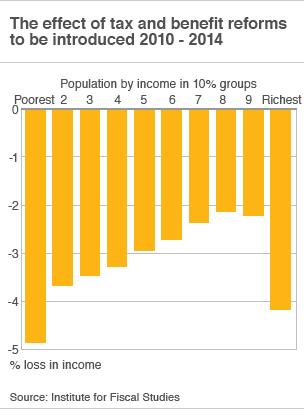Nick Clegg slams 'partial' IFS report on Budget
- Published
Nick Clegg: "People should look at our plans to get people off benefits"
Deputy Prime Minister Nick Clegg has defended the coalition government's analysis of the Budget.
Mr Clegg said a report by the Institute of Fiscal Studies (IFS), which said the Budget has hit poorest families the hardest, was "by definition partial".
"It does not include the things we want to do to get people off benefits and into work," he said during a visit to the Disasters Emergency Committee headquarters in central London.
The IFS calls the Budget "regressive".
It had already challenged the government's claim that the Budget was "progressive".
Its analysis suggests that low-income families with children are set to lose the most - about 5% of net income - due to benefit cuts announced in the Budget.
The think tank's report was commissioned and part-funded by the End Child Poverty campaign.
Fiona Weir from the campaign group told the BBC: "This government really needs to start matching what it's saying about fairness and what it's actually putting into practise with Budget decisions."
'Full-square behind'
The IFS analysis suggests that cuts to areas such as housing benefit and disability allowance would hit the poorest to the tune of £422 between the Budget and April 2014.

Other income groups are forecast to lose larger amounts in cash terms, but as a percentage of take-home pay, the poorest 10% will be hardest hit, the report says.
Mr Clegg, who has taken over much of David Cameron's work while the prime minister is on holiday, said: "If you just look at who is receiving benefits then, in a sense, you don't ask the most important question of all, which is how you can relieve poverty and make Britain fairer by getting people off benefits and into work."
The Treasury has said it stands "full-square behind" its Budget analysis.
It says the IFS's analysis ignores the pro-growth and employment effects of Budget measures, such as helping households move from benefits into work, and reductions in corporation tax.
'Decisions, not words'
The report concluded: "Once all of the benefit cuts are considered, the tax and benefit changes announced in the emergency Budget are clearly regressive as, on average, they hit the poorest households more than those in the upper middle of the income distribution in cash, let alone percentage, terms."
James Browne from the IFS also told Radio 4's Today programme: "However, when you also include the measures that were pre-announced by Alistair Darling in previous Budgets and pre-Budget reports, the overall package does seem somewhat regressive, particularly within the bottom nine-tenths of the income distribution."
Shadow chancellor Mr Darling said: "Just last week George Osborne told us that his Budget was 'fair'.
"But it's decisions, not warm words, that count. Today there's conclusive evidence that far from being fair, the coalition has hit the poorest hardest, especially those with children."
Tax and benefit reforms
In George Osborne's June Budget, the chancellor increased VAT from 17.5% to 20% and cut welfare spending.
Child benefit and public sector pay were frozen and 25% cut from public service spending.
The IFS said: "Low-income households of working age lose the most as a proportion of income from the tax and benefit reforms announced in the emergency Budget.
"Those who lose the least are households of working age without children in the upper half of the income distribution.
"They do not lose out from cuts in welfare spending, and they are the biggest beneficiaries from the increase in the income tax personal allowance."
The report also questioned the government's decision to use the Consumer Prices Index (CPI) instead of the Retail Prices Index (RPI) when calculating certain benefits.
The report said that more than three-quarters of benefit claimants were affected by increases in housing costs, which are included in the RPI.
Many analysts say that government spending cuts often have a disproportionate impact on the poorest households.
They site the example of Canada, which cut spending sharply in the 1990s and saw the gap between rich and poor widen. The same phenomenon has occurred in Sweden and Finland, they say.
Timescales
The BBC's chief economics correspondent Hugh Pym says the disagreement between the Treasury and the IFS over their forecasts was about timescales.
When George Osborne said in the Budget the measures were progressive, he was referring to changes taking effect by 2012. The IFS argues that we should look at a longer period, up to 2014, taking in a fuller range of measures including cuts to housing benefit.
On that basis, the IFS stands by its analysis that the full package of measures, taking in Alistair Darling's last Budget and Mr Osborne's changes, is regressive, our correspondent says.
- Published24 June 2010
- Published22 June 2010
- Published20 June 2010